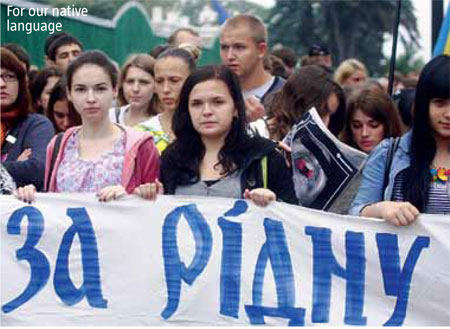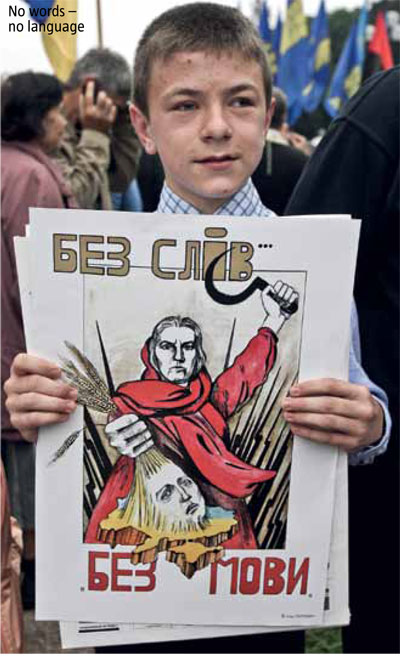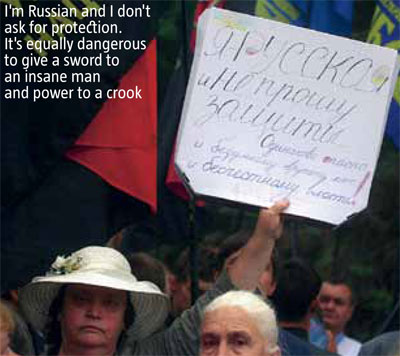Political battles over the language issue have reached their peak. The war is not likely to abate if the infamous draft language law, sponsored by MPs Kolesnichenko and Kivalov, is eventually passed. Two things are already plain to see. One is that the supporters of the Ukrainian language are slowly and steadily losing ground. The other is that even under the current regime, the process can be slowed down significantly, or reversed if the government changes. That, however, will require a drastic change in the patriotic rhetoric of the chosen representatives of the people.
ATTACK IS THE BEST FORM OF DEFENSE
Virtually all critics of the draft language law said that it would lead to the Ukrainian language being squeezed out of use. This often looked like traditional weeping in the style of folk ballads, leaving many with the impression of a battle lost long before it has come to an end. But this is not the main problem. Neither is the fact that too little is said about other shortcomings of the draft law, which are outlined below. The strategic mistake of those protecting the Ukrainian language is the lack of a clear positive incentive, as all they do is just try to maintain the status quo. Meanwhile, they realize full well (and state publicly) that the current “linguistic” situation in the country is far from being satisfactory for the preservation of either the Ukrainian language or statehood itself. The processes that the draft law could trigger (such as deepening the language divide of society) are already unfolding today, albeit much more slowly than they would if the latter is passed by parliament. Sociological surveys show that the number of Ukrainian and Russian speakers is increasing continuously at the expense of bilinguals.

Given the fact that Ukrainian-speakers speak Russian much better than Russian-speakers speak Ukrainian, the only solution for the dilemma is to have people learn Ukrainian if they want the country to be bilingual. As a first move to implement this principle is the submission of a pro-Ukrainian language draft law to counterbalance the imperfect and anti-Ukrainian one proposed by Kolesnichenko and Kivalov. Even if it is not passed by the current parliamentary majority, the draft law would definitely carry certain benefits. It would urge society to consider two alternative bills rather than just one; show that opposition MPs are actually doing their job and leaving some legislative initiatives ready for the future when the current government is no longer in power. So far, though, the united opposition continues to be incapable of doing anything to change the situation.
THE CIVILIAN POPULATION WINS WARS
Judging by sociological surveys, most Ukrainians do not advertise their interest in the language issue. Whenever it is brought up in politics, people tend to become slightly more radical, but the language issue still never becomes a priority for them.
Most people don’t really understand why such issues should concern them, as they feel perfectly comfortable speaking surzhyk, a mix of Ukrainian and Russian, which is widespread in rural parts of Central, South-Eastern and Northern Ukraine.

There may be many complaints about how indifferent and inert such “small Ukrainians” are, but they are the ones who will determine the mid-term prospects of the Ukrainian language. Meanwhile, supporters of the Ukrainian language leave them out, appealing only to those who already have an understanding of what is going on. Yet, bringing into the spotlight the amount of public spending the current draft language bill will incurr should it be implemented, could have a powerful impact on social preferences (critics should also mention the blatant lies of Kivalov and Kolesnichenko, who state that it “requires no” public spending at all).
SEEING THE GLASS HALF-FULL OR HALF-EMPTY?
This is where the art of propaganda lies, and the initiators of the language war are much better at it than their opponents.
On the basic level, they include frequent distortions and misleading messages. Inna Bohoslovska, the notorious Party of the Regions’ MP, recently wrote in a blog that the draft law protects the right of people to speak their native language in everyday life. In fact, though, the draft law is not about this, and in any case, people have never been deprived of this right. Yet, some voters, including the abovementioned share of the population who are not concerned with the language issue, see these messages as something clear and specific, unlike the obscure pleas of patriots to “save the language.”
This means that each and every one of these little messages should be explained to the public. A better solution would be to create an informational background that eliminates any opportunity for absurd claims, even if they seem to be academically reasonable in some cases, such as the claim that the language situation should be regulated by the market and the only task of the government is “to give everyone equal opportunities.”
According to Vadym Kolesnichenko, one of the draft law’s sponsors, Ukrainians must be voting for Russian as the second official language with their cash, since most books and newspapers in Ukraine are published in Russian. But this is not realistic, as their promotion is largely paid for by Russian oil and gas dollars. It is also misleading, as the fact that Ukrainians read in Russian does not necessarily mean that they would refuse to read in Ukrainian if there were no unfair competition from Russian-language publications (given the support from Russia).

The key manipulation, however, lies in the fact that the market can and should supposedly regulate such issues. Smoking can be used as an example. It, wh is legally prohibited in the public establishments of European and now Ukrainian cities. I don’t know about the Ukrainian Cabinet of Ministers, but European governments did not ban smoking at watering holes out of respect for non-smokers, but because smoking-related illnesses are a great burden on social medicine, not to mention labour efficiency. What if the governments had not interfered in the private lives of every smoker? Exactly, the bad habit would have spread further, as it is in the interests of the market. Of course, Russian, just like any other language, cannot be compared to smoking. The point is to show that the market does not necessarily regulate social life in the direction that is good for a given community. On the contrary, it can encourage developments that run counter to the interests of society. Even if the community realized the damage to itself, it is not capable of resisting the market without government interference. This, after all, is the purpose of the government.
Such arguments should be communicated to different target groups in different ways. The key thing is to make sure that they are expressed clearly and communicated effectively. So far, though, the initiative is entirely in the hands of anti-Ukrainian forces. Most importantly, many Ukrainians see the initiators of the language war from the Party of Regions as victims, who are only protecting themselves from “severe Ukrainianization” even though there has been no consistent, let alone severe, Ukrainianization over the past 20 years, and it is the official status of the Ukrainian language as a single state language that keeps the nation essentially bilingual, while the purpose of initiatives such as the current draft language law, is to ruin this shaky balance.
Frankly, the initiative presented as “the protection of minority languages” is in fact the expansion of the Russian language, while the preservation of bilingualism is referred to as “Ukrainianization”, for some reason. Clearly, unless this paradigm is changed, the opposition has no reason to look forward to any strategic accomplishments, while changing the overall language policy is impossible unless pro-Ukrainian forces attain a position of power. Waiting for this to fall into their laps is futile, they have to take action.

